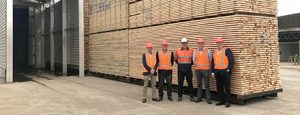
Timberlink’s new Contra Flow Kiln (CFK) with (L-R) Nick McBride, Marcus Kuller, Roy Dias (Site Manager), David Oliver (GM Sales, Marketing & Corporate Affairs) and Minister David Ridgway.
In a week when the industry as a whole seemed to take a deep breath, there were three or four events of note. In Tasmania, the State Government has made a clear and bold decision to legislate for mechanical fuel reduction to tackle bushfires. Source: Bruce Mitchell
Premier Peter Gutwein said the legislation would make it easier for authorities to undertake bushfire mitigation measures such as fuel reduction burns and announced the creation of two new “fuel reduction teams”.
A new State Operations Centre will be established in a central location from which all emergency services could coordinate response to emergencies.
And just for good measure the proposed legislation would make it easier for landholders to reduce fuel loads by allowing approvals to be granted in a shorter period when a bushfire hazard management plan is in place.
Mr Gutwein and has advisors have been listening to the experts, it would seem.
Experts such as Professor Rod Keenan who stated the obvious when he said there was only one way to make bushfires less powerful: take out the stuff that burns.
He believes that hazard reduction, done well, would limit a bushfire’s spread and makes suppression easier, by reducing the amount of flammable material.
The New South Wales and Victorian state governments need to pay attention to what is going on in Tasmania.
Mr Gutwein’s plan is sensible. It is logical. It is admirable
So far, on the surface at least, opposition to the proposed legislation has been muted, if not invisible. Even the Bob Brown Foundation has remained silent. Or it is just keeping its powder dry. We’ll see.
Of course, in Victoria, the Greens’ opportunistic attack in State Parliament on bushfire recovery workers this week was possibly inevitable, and definitely way below the belt.
The Greens’ Member for Melbourne Ellen Sandell suggested that that bushfire recovery workers undertaking roadside clearing for safety were somehow exploiting their role in an effort to gain additional timber.
The comments, quite rightly, was slapped down by Gippsland MP and Shadow Assistant Minister for Forestry, Gary Blackwood, who labelled them a disgrace.
One can’t help but ponder that had Ms Sandell made her comments outside the House, and not with the protection Parliamentary Privilege, she may have attracted some form of legal action.
Parliamentary Privilege was not created for this purpose and should be used for such scurrilous rumour mongering.
But the Greens, and the Victorian State Government in particular, are not interested in what is right; rather they are, as Mr Blackwood has said, completely driven by ideology and not what is best for the sustainability of the country’s forests.
Hence, we have the State Government’s rejection of a request to take the Parliament to East Gippsland.
It’s not an unreasonable request.
The Legislative Council will sit in the northeast later this year after a Liberal Nationals motion in the Upper House was successful last month.
A sitting in Victoria’s East Gippsland would help show local communities who have just suffered through some of the worst fires in the State’s history that their State Parliament is with them.
Meanwhile Timberlink this week began the “sale” of its Cross Laminated Timber (CLT) and Glue Laminated Timber (GLT) manufacturing facility proposal.
It has targeted two sites; Victoria because that’s where the market it; and Tarpeena in the Green Triangle because that’s where the timber is, and where Timberlink’s multi-million-dollar Tarpeena mill facility is.
So, this week South Australia’s Trade Minister David Ridgway, local MP, the Member for MacKillop Nick McBride, and Marcus Kuller, an Export Adviser for Tradestart South Australia, were at the Tarpeena site to inspect progress on the high-tech multimillion-dollar mill upgrade, including its recently commissioned second Contra Flow Kiln, and its potential for further investment.
They were suitably impressed. Hopefully, the final decision will not come down to a two-State bidding war.
The project has merit of the highest order, and it can only be hoped it goes to the right place for the right reasons.






